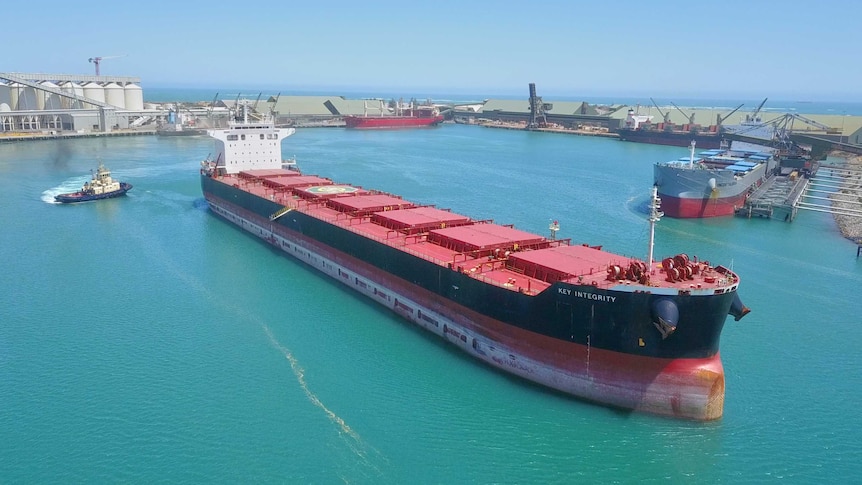Australia Weather News

An iron ore carrier sails out of Geraldton Port, a vital export point for the region's miners. (ABC News: Chris Lewis)
Weather conditions at a West Australian port have caused record shipping delays, led to cost increases and created challenges for farmers, exporters and miners.
Winter storms and long waves, which have an extended period between crests, have caused surges in water levels at Geraldton Port, resulting in excessive and unsafe ship movements.
The CBH Group receives farmers' grain and operates most of the wharf-based grain loading facilities in the state.
It is also one of Australia's largest grain exporters.
CBH Geraldton zone general manager Collette Newton said the cooperative had lost 900 hours of ship loading time at the port due to surge closures from October to August, doubling the previous delay record.
"We have seen an unprecedented level of surge," she said.
"We've seen a spike in surge since June.
"All port users have been affected, including us."
Ms Newton said the cooperative was averaging a 16-day turnaround for ships at Geraldton, which was "a lot higher" than what was ideal.
Cost blowouts
Shipping records show some ships have experienced much longer turnaround times.
Bulk carrier Kea arrived in Geraldton on July 15 to be loaded with 18,000 tonnes of wheat, but the CBH-chartered ship did not depart until August 26.
Industry estimates put the daily shipping rate for vessels of that size at $15,000, meaning the 41 days the vessel spent in Geraldton could have amounted to $615,000.
Records show four ships, the YM Summit, the Ultra Esterhazy, the Ocean Makmur and SSI Providence were at anchor in Geraldton for more than 30 days during July and August.
Some grain exporters are understood to be changing their plans to avoid Geraldton because of its track record of delays.
Ms Newton said CBH had moved some vessels to other ports and increased its road capacity to relieve some pressure on the port.
She said that despite the challenges, the cooperative had exported nearly 3 million tonnes of grain this season, putting it in a "really good position" to deal with the upcoming grain harvest.
Ms Newton said CBH was also in the process of upgrading some port storage.
The next port is 450 kilometres away at Kwinana.
250-hour closure
Fenix Resources shipped 2.4 million tonnes of iron ore from the Geraldton Port last financial year.
Executive chair John Welborn said in July alone, the port was closed for 250 hours due to surge, and that made logistics difficult.
"The impact of surge events slows down our ability to ship, and therefore delays the receipt of revenue," he said.
"The most important thing is to be efficient with our ship movements.
"It's a big cost to us if there is demurrage, if the ship is required to stay at anchor, that's inefficient."
Mr Welborn said the Geraldton port was an important export terminal for WA and vital for the Mid West.
Despite the port closures, he said the miner was still usually able to turn vessels around in 24 hours.
"We are loading around 60,000 tonnes of iron ore at Berth 5 in Geraldton," Mr Welborn said.
"The Mid West Ports Authority can load that material from our storage facility at about 3,000 tonne an hour."
Like CBH, Fenix owns and operates an integrated supply chain, from its mines in the Mid West, to road haulage and port storage companies.
$350m upgrade
Construction of a 400 metre breakwater at Geraldton is due to begin next year as part of a $350 million port upgrade.
Mid West Ports Authority chief executive Damian Tully said reducing surge impact was the number one priority in the upgrade, and he estimated the breakwater would reduce surge delays by 60 to 80 per cent.
He said the port was averaging 32 days per year of surge-related delays, but this year had been "one of the worst".
"We have seen an unprecedented number of weather events affecting us over winter this year," he said.
Mr Tully said the port was meeting with all impacted customers to plan the most efficient shipping as possible.
ABC